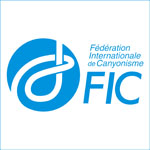 The history of the Fédération Internationale de Canyonisme (FIC) begins with the desire to have an international canyon festival. The first international canyon festival was named “RIC” which stands for three French words: “Rassemblement Internationale de Canyon.” In 2003, Rich Carlson, USA and Koen Viaene, Belgium wanted to create a venue wherein canyoneers from around the world could come together and share information. Koen set about organizing the first two RICs in Europe. Rich organized for North America in Mexico. Since then, various canyoneers have been co-sponsoring canyon rendezvous around the planet annually. The RIC organizers connect with local canyoneers in a particular location: wishes are made, people get excited, plans develop and voila, a RIC is born. Typically, about 200 individuals from at least 15 countries attend these events.
The history of the Fédération Internationale de Canyonisme (FIC) begins with the desire to have an international canyon festival. The first international canyon festival was named “RIC” which stands for three French words: “Rassemblement Internationale de Canyon.” In 2003, Rich Carlson, USA and Koen Viaene, Belgium wanted to create a venue wherein canyoneers from around the world could come together and share information. Koen set about organizing the first two RICs in Europe. Rich organized for North America in Mexico. Since then, various canyoneers have been co-sponsoring canyon rendezvous around the planet annually. The RIC organizers connect with local canyoneers in a particular location: wishes are made, people get excited, plans develop and voila, a RIC is born. Typically, about 200 individuals from at least 15 countries attend these events.
The list of RICs:
2003: Aragon, Spain Coordinated by Federation Francaise de Speleologie-Ecole Francaise de Canyonisme (FFS-EFC) and Federacion Aragonesa de Espeleologia (FAE)
2004: Aragon, Spain coordinated by FFS-EFC
2005: Mexico coordinated by ACA and FFS-EFC
2006: Mirtros, Crete, Greece coordinated by ACA & FFS-EFC
2007: Loutra Ypatis, Greece coordinated by ACA, Hellas Canyon and FFS-EFC
2008: Utah, USA coordinated by ACA
2008: Vercors, France coordinated by FFS-EFC
2009: Santa Antao, Cabo Verde coordinated by FFS-EFC
2010: Sardinia, Italy coordinated by Associazone Italiana Canyoning (AIC)
2011: Nepal coordinated by Nepal Canyoning Association (NCA), Himalayan Canyon Team (HCT) and X- Canyoning Team
2012: Minas Gerais, Sierra da Canastra, Brazil coordinated by Grupo Brasileiro de Canionismo (GBCAN)
2013: Madeira, Portugal coordinated by FFS-EFC
2014: Baleares, Mallorca, Spain coordinated by Balearik & FFS-EFC
2015: Ouray, Colorado coordinated by Ouray Canyon Coalition, Coalition of American Canyoneers (CAC) and FIC (then named International Association of Amateur Canyoning, IAAC)
2016: Flores, Azores, Portugal coordinated by Canyoning International Meeting in the Azores (CIMA), Associação Desportos Aventura (Desnível) and FIC
2017: Reunion Island coordinated by FFS-EFC and FIC
2018: Ticino coordinated by FIC and Canyonland (Swiss non-profit)
 In 2014, French canyoneers collaborated with canyoneers from around the world to form a new association: International Association of Amateur Canyoning (IAAC). The association is dedicated to recreational (aka “amateur” in French law) canyoning. The primary goal of IAAC is:
In 2014, French canyoneers collaborated with canyoneers from around the world to form a new association: International Association of Amateur Canyoning (IAAC). The association is dedicated to recreational (aka “amateur” in French law) canyoning. The primary goal of IAAC is:
• facilitate networking of canyoneers around the world in order to exchange relevant information about canyoning
• develop international canyoning
• support actions of canyon associations with their political, legal, administrative and economic institutions
• develop respect for nature
• develop scientific knowledge in the practice environment
• establish a common reflection on the canyon techniques, trainings and rescue
• promote continuity of RIC
As one can well imagine, the word “amateur” in an association’s title is less than attractive. Such are the challenges of translating from language to language and dealing with varying national legal systems. Consequently, the IAAC changed its name to FIC. This (in French) is “Fédération Internationale de Canyonisme.” In English, FIC becomes “Federation for International Canyoning.” Initially we had a little confusion with English preferring to say: “International Federation of Canyoning.” Hence the initials were either IFC or FIC. However the board of directors has decided to only use FIC.
Membership to the FIC is restricted to associations of recreational canyoneers. That is, for-pay guides or guide associations are not allowed to join. Each country can have up to three representative associations. They would split the vote between them on any FIC issue. At the moment, the FIC is composed of member canyon associations from the following countries: USA, Germany, Austria, France, Spain, Belgium, Brazil, Colombia, Ecuador, Greece, Portugal, Morocco, Algeria, Iran and Mexico. The board of directors is made up of: Sonny Lawrence, President, USA; António Brandão, Vice-president, Portugal; Lluis Domingo, Treasurer, Spain; Lydia Katsarou, Secretary General, Greece; Simone Devus, Assistant Secretary, Brazil; Jeanlouis Giardino, Assistant Secretary, France; Ali Kansari, Assistant Secretary, Iran.
Members of the board of directors are working on various projects. One is to document worldwide educational processes for educating new canyoneers. Each country’s system would be correlated with the others. Another task is to establish a rank level of canyoning ability. For example, a first time attendee to a RIC might discover that they are functioning at a skill level two, yet the desired canyon beta suggests skill level three. Tied to this is the task of developing a worldwide canyon grading system.
Various countries including Spain, Portugal, Brazil, Colombia and Ecuador have been holding canyon competition events. FIC is investigating the role canyon competition may play in international recreational canyoning.
Please encourage any canyoneer you know in any country to join their respective association and request that the association join the Fédération Internationale de Canyonisme.
